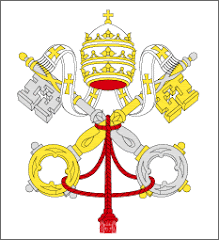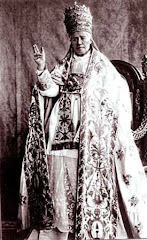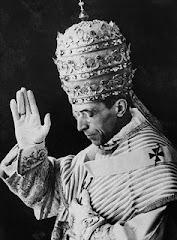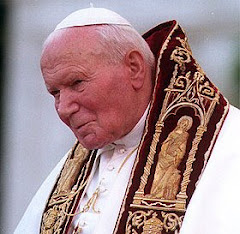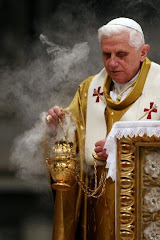The following is a short essay I wrote while I was still teaching. It's also been previously posted on another blog a couple of years ago.In teaching my students about what it means to be an image of God, a much clearer view of human nature has emerged within my own spiritual vision.
What is natural to man? Is indulgence in worldly affairs natural? Is revelry in sexual adventure that which completes man? Are we naturally bound to the desire for the accumulation of material goods? To know what is natural to man, one must first know man’s nature.
To say that something is natural, one is claiming that that which is deemed natural is in accordance with the nature of the thing being observed. Is it natural for a fish to swim? Of course it is. By observing the nature of the fish, the conclusion is easily reached that swimming is natural to the fish, for that is in accordance with its nature. A fish that doesn’t swim quickly dies. A bird that doesn’t fly falls to its death. A man that doesn’t pray is crushed under the weight of the world, for he is not made for the world in both his and its present state.
What, then, is man’s nature? The answer is both simple and profound -- man is an image of God. The image must tell us something of that which it reflects, and if the image is a reflection of the eternal, then to reflect eternity for all eternity is what is natural to it. This is confirmed by St. Gregory of Nyssa in his
Catechetical Orations in which he writes:
"If humanity is called to life in order to share in the divine nature, it must have been suitably constituted for the purpose…That is why humanity was given life, intelligence, wisdom, and all the qualities worthy of the godhead, so that each one of them should cause it to desire the godhead, so that each one of them should cause it to desire what is akin to it. And since eternity is inherent in the godhead, it was absolutely imperative that our nature should not lack it but should have in itself the principle of immortality. By virtue of this inborn faculty it could always be drawn towards what is superior to it and retain the desire for eternity."God is all good, and order is good. Therefore, God is Order itself. We see a reflection of the face of God in the order of His creation. The Orthodox theologian Olivier Clement in his book
The Roots of Christian Mysticism writes:
"Each being manifests the creative word which gives it its identity and attracts it. Each being manifests a dynamic idea, something willed by God. Ultimately each thing is a created name of him who cannot be named."There is order in creation, for its Creator is Order itself, and Order begets order. Man is an image of God; therefore, he is made in the image of Order. Order is part of man’s nature as an image of God; therefore, disorder is unnatural to man.
In God, all of His attributes are one. Because he is eternal and infinite, He cannot be made of parts, nor does He possess parts. He is one is His essence. This has infinite implications, a few being that His order is His love, His love is His justice, His justice is His love, His love is His order, etc. God is all these good things, and man being an image of God finds in them his natural habitat. It is natural for man to have order both in the world and in his mind, will, and body. It is natural for man to love, to seek justice, etc. It is unnatural for man to do anything else. In saying that it is unnatural to man, although man seems tends towards these, I mean to say that it goes against his nature as an image of God. Yet more often than not, we do that which is unnatural to us and claim that it is simply human nature. This couldn’t be farther from the truth! To do anything but love, seek justice, obey God, etc. is to introduce disorder into our minds, wills, and bodies. Disorder in the human soul is manifested in many and various ways, all of which are hideous to the ordered soul.
Who is the man that embraces disorder? He is the one that is confused, addicted, angry, materialistic, yet all the while convincing himself that he has found happiness and contentment. Of course, the conclusions of a disordered mind will almost always be disordered.
How must a disordered system be overcome? By introducing order into the system. When it comes to the human soul made in the image and likeness of Order, Order must be brought into the disordered soul. By an opening up of the soul to the influence of Order through the indwelling of Order can the human soul begin to banish from it the darkness of disorder. This opening up of the soul is called prayer, which is as natural to man as barking is to a dog, as flying is to a bird, as swimming is to a fish. Yet we are like dogs that do not know how to bark and fish that cannot swim. We are dominated by the world which was created to be dominated by us. How absolutely unnatural!
Prayer is our best bet for happiness as happiness can only be found in order. In fact, order is happiness. The purpose of prayer is to turn outside of ourselves, to empty the image in order to be filled with the reality. It is our nature to empty ourselves to both God and neighbor, that in emptying ourselves we may be filled. Fulfillment in emptiness! Yet another of those wonderful Christian paradoxes.
How can we know that our calling is to turn and open to others? If we were created to turn in on ourselves, then our eyes would be facing the opposite direction. We would be created to look inward. But according to nature that is not so. We look outward. It is in looking outward that we can empty ourselves just as the greatest Man, the God-man, did: “Who though He was in the form of God, did not regard equality with God something to be grasped; Rather, He emptied Himself, taking the form of a slave…”
Through prayer, we look outward to the Source of all order and happiness. Through prayer, we empty ourselves of our worldly accretions, placing ourselves under the direct influence of a Perfect Order. As Order begins to reign in our souls, so, too, does love, truth, joy, peace, and all other attributes of God.
We pray in order that the unnatural might be overcome by the natural, that darkness might become light, and that disorder be crushed under the liberating weight of Order.


